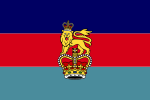Parliamentary and Financial Secretary to the Admiralty facts for kids
Quick facts for kids United KingdomOffice of the Parliamentary and Financial Secretary to the Admiralty |
|
|---|---|

|
|

Royal Arms as used by Her Majesty's Government
|
|
| Ministry of Defence | |
| Style | The Right Honourable (Formal prefix) Secretary to the Admiralty |
| Member of | British Cabinet Board of Admiralty |
| Seat | Westminster, London |
| Appointer | The British Monarch on advice of the Prime Minister |
| Term length | No fixed term |
| Formation | 1625–1959 |
| First holder | Sir Edward Nicholas |
| Final holder | Charles Ian Orr-Ewing |
The Parliamentary and Financial Secretary to the Admiralty was an important job in the British Royal Navy. This person was part of the Board of Admiralty, which helped run the navy. The role was usually held by a Member of Parliament, someone elected to the UK government.
This Secretary acted as a helper to the First Lord of the Admiralty in Parliament. Their main job was to manage all the navy's money and spending plans. This role existed for a long time, from 1625 until 1959.
Contents
History of the Role
The job started way back in 1625. At first, it had different names, like "Secretaries to the Lords Admiral." In 1660, it became officially known as the "Secretary to the Admiralty."
Changes to the Name
Over the years, the name of the job changed several times.
- In 1763, it was called the "First Secretary to the Admiralty."
- Then, in 1870, it became the "Parliamentary Secretary to the Admiralty."
- Finally, in 1886, it got its full name: the "Parliamentary and Financial Secretary to the Admiralty."
Joining the Board
Even though the Secretary attended meetings of the Board of Admiralty, they weren't a full member until 1929. This change meant they had more official power in making decisions for the navy. In 1930, the Secretary also took on the role of "Civil Lord to the Board of Admiralty."
The End of the Role
The job of Parliamentary and Financial Secretary was officially ended in 1959. A few years later, in 1964, the entire Admiralty department was closed down. Its responsibilities were then moved to a new, larger government department called the Ministry of Defence.
What the Secretary Did
The main job of the Parliamentary and Financial Secretary was to handle the Royal Navy's money. This included many different tasks related to spending and finances.
Here are some of their key duties:
- Looking at all new and unusual spending ideas.
- Dealing with any money questions that needed to go to the Treasury (the government's money department).
- Checking accounts for cash, supplies, and dockyards.
- Managing contracts for buying and selling things, except for some specific items.
- Overseeing all financial matters.
- Preparing the navy's budget (estimates).
- Handling questions from the Exchequer and Audit Department, which checks government spending.
- Dealing with general questions about workers and their yearly requests.
- Arranging payments for renting ships.
- Managing the buying and selling of naval and food supplies.
- Handling the purchase and sale of ships.
- Dealing with the buying and selling of supplies in general.
Important People in the Role
Many important people held this position over the centuries. The very first person to hold a similar role was Sir Edward Nicholas in 1625. The last person to hold the title of Parliamentary and Financial Secretary was Charles Ian Orr-Ewing in 1959, just before the office was abolished.
See also
- Permanent Secretary of the Admiralty
- First Lord of the Admiralty
- Board of Admiralty
- British Admiralty
 | John T. Biggers |
 | Thomas Blackshear |
 | Mark Bradford |
 | Beverly Buchanan |

